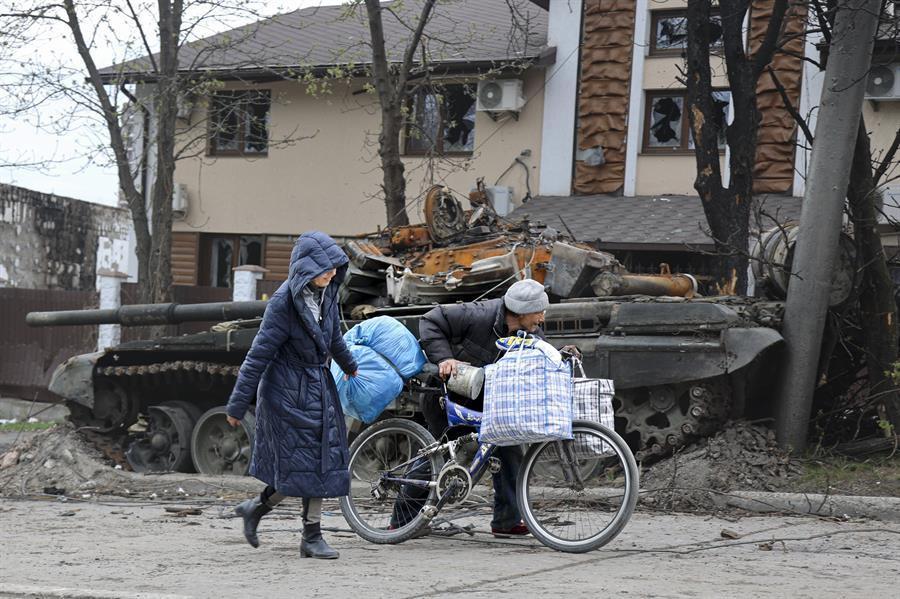
After nearly two months under siege, the southern city of Mariupol could fall into Russian hands within "hours", a Ukrainian official said, as the two sides agreed on Wednesday to a humanitarian corridor to allow civilians to flee the devastated port city.
As fighting raged in the country’s east and south, the president of the European Council Charles Michel arrived in Kyiv, in the latest sign of strengthening ties between Ukraine and the EU.
"In Kyiv today. In the heart of a free and democratic Europe," he wrote on social media.
Michel’s visit comes as the West continues to pour weapons into Ukraine amid a renewed Russian push into the eastern Donbas region where a new offensive launched this week has led to an uptick in fighting.
Hours ahead of Michel’s arrival, the Pentagon said that Ukraine had recently received fighter planes and spare parts to bolster its air force, following repeated calls from Kyiv for heavier weapons.
The Pentagon declined to specify the number of aircraft and their origin.
The announcement came as the battle for Mariupol appeared to be nearing a crucial peak, after months of devastating fighting that has seen untold numbers of civilians trapped.
Control of Mariupol and the separatist-controlled Donbas region in the east would allow Moscow to create a southern corridor to the Crimean peninsula that it annexed in 2014, depriving Ukraine of much of its coastline.
In the latest ultimatum issued in its battle to capture Mariupol, Moscow made another call for the city’s defenders to surrender on Wednesday by 2:00 pm Moscow time (1100 GMT) and announced the opening of a humanitarian corridor for any Ukrainian troops who agreed to lay down their arms.
As the deadline approached, a commander in the besieged Azovstal steel plant issued a desperate plea for help, saying his marines were "maybe facing our last days, if not hours".
"The enemy is outnumbering us 10 to one," Serhiy Volyna from the 36th Separate Marine Brigade said.
"We appeal and plead to all world leaders to help us. We ask them to use the procedure of extraction and take us to the territory of a third-party state."
Thousands of troops and civilians remain holed up in the plant.
An adviser to the mayor of Mariupol described a "horrible situation" in the encircled complex and reported that up to 2,000 people -- mostly women and children -- are without "normal" supplies of drinking water, food and fresh air.
During an interview broadcast on CNN Tuesday, Pavlo Kyrylenko -- who oversees the Donetsk region’s military administration -- insisted Mariupol remained contested.
"The Ukrainian flag is flying over the city," he said.
"There are certain districts where street fighting is continuing. I can’t say the Russians are controlling them."
Offering some respite, Kyiv said early Wednesday it had agreed with Russian forces to open a safe route for civilians to flee the devastated city.
"We have managed to get a preliminary agreement on a humanitarian corridor for women, children and elderly persons," Deputy Prime Minister Iryna Vereshchuk wrote on Telegram.
Elsewhere on the frontlines, Ukraine’s defence ministry reported its troops had beaten back a Russian attack in the city of Izium, south of the partly blockaded second city of Kharkiv in the east.
Kyiv also claimed enemy losses in a Ukrainian counter-attack near the town of Marinka in Donetsk.
The governor of the eastern Lugansk region, Sergiy Gaiday, said Ukrainian forces were holding their ground in the face of heavy fighting.
Russian forces, meanwhile, on Wednesday said its forces had launched 73 airstrikes across Ukraine, hitting dozens of locations where troops were concentrated.
Further from the frontlines, residents were still reeling near the capital Kyiv weeks after Russian forces withdrew from the area.
At a morgue in Bucha, families carefully searched body bags and examined cadavers looking for missing loved ones.
In the car park of the small communal morgue, the body bags arrived in carts or were piled up in trailers, vans and non-refrigerated trucks.
Four hundred bodies have been discovered since the Russians withdrew on March 31, local police chief Vitaly Lobas told AFP. Around a quarter of them are still unidentified.
"The majority died violent deaths" and were shot, Lobas said, declining to provide a concrete figure at this stage.
President Vladimir Putin has said he launched the so-called military operation in Ukraine in February to save Russian speakers in the country from a "genocide" carried out by a "neo-Nazi" regime.
But his forces have faced allegations of war crimes -- most recently from the EU’s Michel during his visit to Kyiv on Wednesday where he toured the devastated nearby town of Borodianka.
"In Borodianka. Like Bucha and too many other towns in Ukraine. History will not forget the war crimes that have been committed here," Michel wrote on Twitter.
"There can be no peace without justice," he added.
Ukranian authorities have said that over 1,200 bodies have been found in the Kyiv region so far.